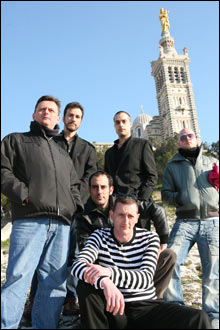
LO CÒR DE LA PLANA: Rigaudon, bourrée, rondeau — meet techno-groove and ragamuffin. |
“Un jour ou l’autre, parlera l’Europe marseillais” — “Sooner or later, Europe will speak Marseille.” That might have been just a sporting-goods-company promotion, but two million Marseillais (out of a total population of 1.5 million!) take it to heart. Founded in 600 BC by Greeks from Asia Minor and subsequently dominated by Romans, Visigoths, Ostrogoths, Saracens, Franks, Aragonese, Angevins, and, now, Parisians (just remember, the national anthem is not called “La Parisienne”!), France’s second-largest city is a Mediterranean melting pot of people from Italy, North Africa, Spain, Greece, Corsica, Turkey, Armenia, Vietnam, and China, for starters. Marseille already speaks Europe, and much more, but these days, the city’s music is turning to the Occitan language of the South of France, the language of the mediæval troubadours, and finding inspiration, as well as a cultural identity, in its dense, intricate poetry. Massilia Sound System opened the door in the ’80s with their trobamuffin hip-hop, singing in both Occitan and French. Now another Marseille group, Lo Còr de la Plana, have grabbed the baton, and they’ll be bringing it to the Somerville Theatre this Friday, October 3.Like Italian, French, and Spanish, Occitan developed from Latin, but its true sibling is Catalan, as spoken in Barcelona and Valencia. (What to call this language is a very hot potato.) In the Middle Ages, it was the lingua franca of the Western Mediterranean, the preferred language of Eleanor of Aquitaine and Richard the Lionheart. Dante gave some thought to writing his Commedia in Occitan, the better to be understood outside Tuscany. (Had he done so, the history of Occitan, and of Italian literature, would have been quite different.) He settled for a brief hommage (albeit in Purgatorio) to the 12th-century troubadour Arnaut Daniel, whom he called “il miglior fabbro” — “the best craftsman.” (Seven centuries later, Ezra Pound called Arnaut, who’s credited with the invention of the sestina, the best poet who ever lived.)
The rise of the Cathar religious movement, also in the 12th century, marked the beginning of the end of the troubadour language and culture. The French kings flew the banner of religious orthodoxy as an excuse to invade the South and extend their royal prerogative. Yet the Occitan language never completely disappeared. It’s not hard to see why. Occitan is more compact than Italian, less abstract than French, grittier than Spanish —you could call it the missing center of the Romance languages. With its huge lexicon, it’s a wordsmith’s delight. Frédéric Mistral shared the 1904 Nobel Prize for Literature for his writing in Provençal (notably the long poem Mirèio). Neither is it hard to see why it’s being taken up by France’s current hip-hop generation, the descendants of the troubadours. Bernat de Ventadorn and Bertran de Born and Arnaut Daniel and Folquet de Marseilla didn’t just revel in the adulterous fantasies of fin’ amor — they also had the sirventes, a song of social or political satire, and the tenso, a debate between two troubadours. (Or between a troubadour and a trobairitz, for there were also women troubadours.) The legacy of those sound-system battles between Afrika Bambaataa and Kool Herc goes back beyond the cutting contests of Kansas City jazz and Harlem rent parties.

But, mèfi (listen up), Marseille is the focal point. In the ’80s there was IAM as well as Massilia Sound System, an outfit that developed out of the Lively Crew of Akhenaton and Khéops. They played off the tendency of French highway signs to abbreviate Marseille as “Mars”; one explanation of their acronym was “Invasion Arrivée de Mars,” and their first major hit was the 1991 album . . . de planète Mars. Marseille itself didn’t object to being thought of as another planet. The city speaks two French languages (aside from all the international ones): français marseillais and provençal marseillais, the two more like each other than like French or Provençal. There’s the tchatche in Marseille, the chat, and the tendency to exaggerate, just a little, like the time Marseille humorist Patrick Bosso identified his city as the one “where the sun shines 453 days a year.”